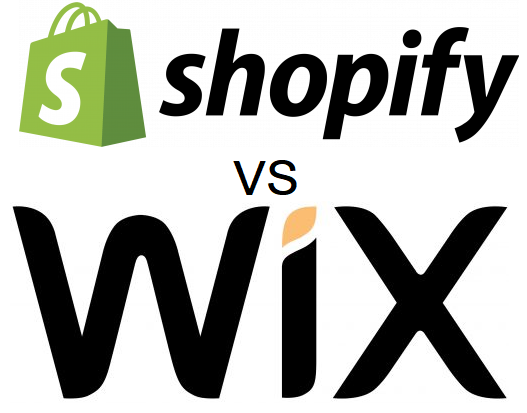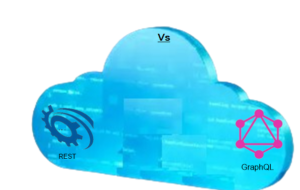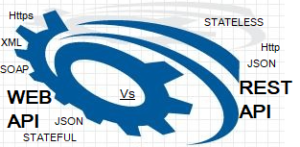Introduction
“Shopify vs Wix” – a common dilemma faced by many entrepreneurs and business owners when deciding on the most suitable e-commerce platform for their online venture. Both Shopify and Wix are renowned for their unique strengths and capabilities, but choosing the right one can be a challenging decision. In this blog post, we’ll embark on a detailed exploration of these two popular platforms, comparing them across various critical aspects to help you make an informed choice that aligns with your business goals. Whether you’re launching a new online store or thinking about switching platforms, this guide will provide you with the insights needed to navigate the choice between Shopify and Wix effectively.
Table of Contents
Shopify vs Wix: Platform Overview
When choosing an e-commerce platform for your online business, two names often come up in the conversation: Shopify and Wix. Both platforms have carved out significant niches in the e-commerce world, but they cater to different needs and audiences. Understanding the core attributes of Shopify and Wix is crucial in determining which platform aligns best with your business goals.
Shopify: A dedicated e-commerce platform, Shopify is designed specifically for online retail businesses. It offers robust features tailored for e-commerce, including advanced inventory management, a wide array of payment gateways, and extensive app integrations. Shopify’s primary focus is to provide a comprehensive solution for online stores, regardless of their size. This makes it a go-to choice for entrepreneurs who need a powerful, scalable platform dedicated to online selling.
See (negativeunderware.com) a successful Shopify designed e-commerce store below:

Wix: Originally known for its website-building capabilities, Wix has expanded into the e-commerce space. Wix excels in offering a user-friendly interface with drag-and-drop functionality, making it appealing for those who prioritize ease of design and simplicity. While it might not offer as extensive e-commerce features as Shopify, it provides enough functionality for small to medium-sized online stores. Wix is often preferred by creatives and small business owners who want a beautiful website with integrated e-commerce capabilities.
Both Shopify and Wix have their unique strengths. Shopify stands out as a specialized e-commerce powerhouse, ideal for businesses focused solely on online sales. Wix, on the other hand, offers a more balanced approach, combining website aesthetics with e-commerce functionality, making it suitable for businesses that want an all-in-one solution for their online presence.
See below Wix developed website

Ease of Use
When comparing Shopify and Wix, the aspect of ease of use is a critical factor for many business owners, particularly for those who are new to the world of e-commerce. Both platforms cater to users who prefer a straightforward, user-friendly experience, but they do so in different ways.
Shopify: Known for its streamlined, intuitive interface, Shopify makes setting up an online store relatively simple. Its dashboard is well-organized, making it easy for users to find features and manage their store. For beginners, Shopify provides a step-by-step guide to get their store up and running. Despite its powerful e-commerce tools, Shopify maintains a user-friendly experience, ensuring that even those with minimal technical skills can efficiently operate their online store. However, when it comes to more advanced customization, a basic understanding of coding can be beneficial.
See below Shopify user friendly Dashboard

Wix: Wix takes ease of use to another level with its drag-and-drop website builder. This approach allows users to design their websites visually, without needing any coding knowledge. The platform is particularly favored by those who prioritize design and want to create a unique look for their store with minimal effort. Wix’s editor is intuitive, offering a wide range of templates and design elements that can be easily customized. This makes Wix an ideal choice for small business owners or creatives who want a visually appealing online store without the complexity of a more robust e-commerce platform.
See below Wix drag and Drop functionality to customize your own site:

In summary, Shopify and Wix both offer easy-to-use interfaces, but their approaches differ. Shopify focuses on providing a straightforward platform for setting up and managing an online store, with an emphasis on e-commerce functionality. Wix, conversely, excels in offering creative freedom through its intuitive design tools, ideal for those who value aesthetics and simplicity in website creation.
Design and Customization
The design and customization capabilities of an e-commerce platform significantly impact the overall appeal and functionality of an online store. When comparing Shopify and Wix in this regard, each platform offers unique features and tools to cater to various user needs.
Shopify: Shopify is renowned for its wide range of professional and aesthetically pleasing themes. Although the number of free themes is limited, its premium themes offer diverse design options suitable for different industries. Each theme is also customizable, allowing users to tweak the design to better fit their brand. Shopify’s customization, while robust, can be somewhat technical. Users with knowledge of HTML and CSS will find it easier to make more intricate customizations. However, even without technical skills, the basic customization options are sufficient to create a visually appealing and functional online store.
Wix: Wix excels in design flexibility, largely due to its drag-and-drop editor. It offers a vast selection of templates, all of which are highly customizable. Users can change almost every element on their website, from layouts to fonts and colors, without any coding knowledge. This level of customization is particularly appealing to those who wish to create a unique and visually distinct online presence. Wix’s approach is more design-oriented, making it an excellent choice for businesses that prioritize creative expression and individuality in their online store design.
In essence, Shopify offers a more streamlined approach to design with professional templates and customization options that might require some technical know-how. Wix, on the other hand, provides extensive creative control with an intuitive interface, ideal for users who want to personalize every aspect of their site without delving into code.
E-commerce Features
E-commerce features are the backbone of any online store, and a detailed comparison of Shopify vs Wix in this area is essential for understanding which platform better suits your business needs.
Shopify: Shopify is a powerhouse when it comes to e-commerce features. It’s built to cater to online stores of all sizes, offering a wide range of tools right out of the box. Key features include advanced inventory management, a variety of shipping options and integrations, comprehensive customer profiles, and abandoned cart recovery. Shopify also excels in payment processing, supporting over 100 payment gateways and offering its own Shopify Payments solution. Additionally, the platform provides robust analytics and reporting tools, enabling business owners to make data-driven decisions.
Wix: Wix, while initially more focused on website building, has significantly improved its e-commerce capabilities. It provides essential features like product management, a secure checkout process, multiple payment options, and basic inventory tracking. Wix also offers decent marketing tools, including email campaigns and social media integration, which are crucial for online business growth. While it might not match Shopify’s extensive feature set, Wix covers the basics well, making it a good option for smaller e-commerce operations or businesses that don’t require advanced e-commerce functionalities.
In summary, Shopify stands out with its comprehensive set of e-commerce features designed for a fully-fledged online store, offering scalability and versatility. Wix, on the other hand, offers sufficient e-commerce capabilities for small to medium-sized businesses, with a focus on simplicity and ease of use.
Payment Processing and Transaction Fees
In the realm of e-commerce, the efficiency and cost-effectiveness of payment processing are crucial. A detailed look into how Shopify and Wix handle payment processing and transaction fees can provide valuable insights for businesses deciding between the two platforms.
Shopify: Shopify offers a wide range of payment options, including its own Shopify Payments solution and integration with over 100 other payment gateways like PayPal, Stripe, and Apple Pay. One of Shopify’s significant advantages is its Shopify Payments feature, which eliminates transaction fees typically incurred when using other payment gateways. However, if you choose to use an external payment gateway, Shopify charges additional transaction fees, which vary depending on your chosen plan. These fees decrease as you upgrade to higher-tier plans.
Wix: Wix also supports various payment methods, including PayPal, Stripe, and Wix Payments, its native payment solution. Wix Payments is a straightforward option, offering seamless integration with your store. Unlike Shopify, Wix does not charge additional transaction fees for using external payment gateways. This can be a cost-effective advantage for small businesses or startups that are budget-conscious.
Both Shopify and Wix provide secure and reliable payment processing options, but their approaches to transaction fees differ. Shopify is more flexible with its payment options but imposes transaction fees for external gateways, whereas Wix offers simplicity and cost-effectiveness by not charging extra transaction fees.
Pricing and Plans
Understanding the pricing and plans of both Shopify and Wix is crucial for businesses to determine which platform aligns best with their budget and requirements. Both offer a range of plans to cater to different business sizes and needs.
Shopify: Shopify’s pricing is straightforward and caters primarily to e-commerce businesses with a range of scales and complexities. It offers several plans:
- Basic Shopify: Ideal for small businesses just starting out. It includes all the basic features needed to launch an online store.
- Shopify: Suitable for growing businesses that require more advanced features.
- Advanced Shopify: Best for scaling businesses that need advanced reporting and lower transaction fees.
Each plan comes with its own set of features, with higher-tier plans offering more advanced functionalities. Additionally, Shopify charges transaction fees unless you use Shopify Payments.

Wix: Wix offers a simpler pricing structure, which is attractive for smaller businesses or individuals:
- Business Basic: Good for small businesses looking to start their online store.
- Business Unlimited: Offers more storage and additional features for growing businesses.
- Business VIP: Provides the full suite of Wix features, including priority support.
Wix plans are generally more affordable than Shopify’s but may lack some advanced e-commerce functionalities found in Shopify’s higher-tier plans.
When comparing Shopify vs Wix in terms of pricing, Shopify is more e-commerce-centric with its plans and pricing, making it a potentially better choice for businesses focused solely on e-commerce. Wix, however, offers a more cost-effective solution for smaller businesses or those who require a simple online store combined with a robust website.

Integrations and Add-Ons
In today’s dynamic e-commerce environment, the availability and diversity of integrations and add-ons play a significant role in enhancing the functionality of an online store. When comparing Shopify vs Wix in this aspect, it’s important to understand how each platform supports businesses through these extensions.
Shopify: Shopify excels in offering a vast library of integrations and add-ons through its Shopify App Store. These apps cover a wide array of functionalities, from advanced inventory management and accounting to marketing and sales channel integration. Notable apps include Oberlo for dropshipping, Klaviyo for email marketing, and Yotpo for reviews. Shopify’s app ecosystem is designed to cater to a range of business needs, allowing store owners to add complex features as their business grows.
Below is the popular apps that can be add to your Shopify Store:
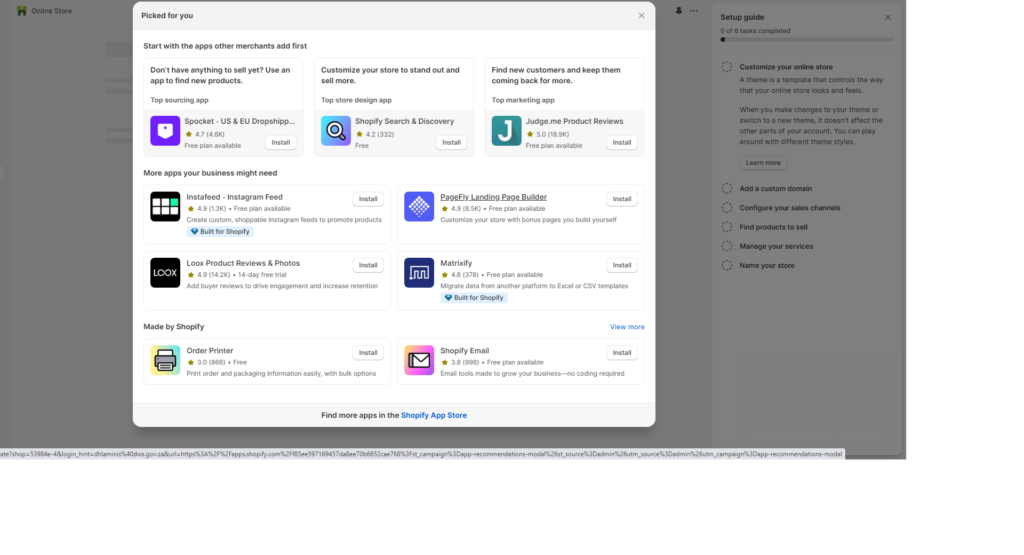
Wix: Wix provides a substantial selection of add-ons through the Wix App Market. While the number of apps is fewer than Shopify’s, Wix focuses on offering key integrations that are essential for small to medium-sized businesses. These include apps for email marketing, social media promotion, and customer relationship management. Wix add-ons are generally easier to integrate and manage, making them suitable for business owners who prefer simplicity and ease of use.
Both Shopify and Wix offer valuable integrations and add-ons to enhance your e-commerce capabilities. Shopify is more robust, offering a wider variety and depth of apps for businesses looking to expand and customize extensively. Wix, while offering fewer apps, provides streamlined, user-friendly add-ons, ideal for less complex or smaller-scale e-commerce operations.
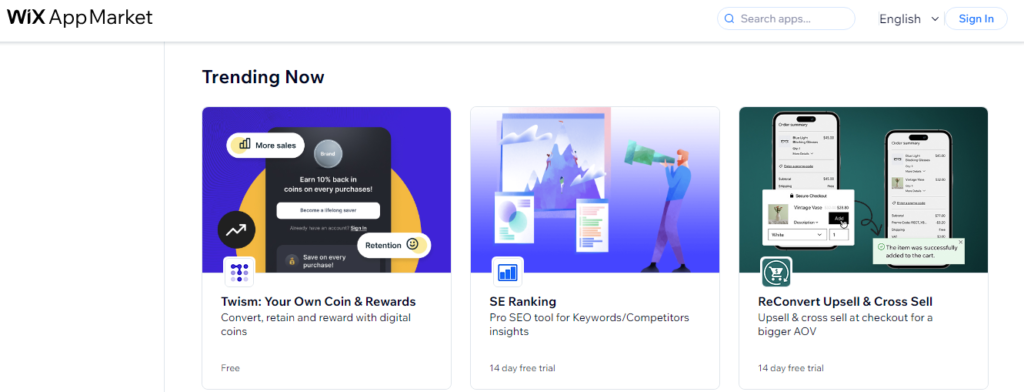
SEO and Marketing Tools
In the digital marketplace, effective SEO (Search Engine Optimization) and marketing tools are crucial for driving traffic and increasing sales. Both Shopify and Wix offer a range of features in this area, but they approach SEO and marketing in slightly different ways.
Shopify: Shopify is well-equipped with built-in SEO features that help optimize online stores for search engines. This includes customizable H1 tags, title tags, and meta descriptions, as well as automatically generated sitemaps and robot.txt files. Shopify also excels in site speed and mobile optimization, which are key factors for SEO. For marketing, Shopify offers various tools like email marketing integration, social media promotion, and the ability to create discount codes and gift cards. The platform also has a suite of analytics tools to track the performance of marketing campaigns.
Wix: Wix provides a user-friendly SEO experience, particularly suitable for beginners. It offers an SEO Wiz tool, a step-by-step guide to help users improve their site’s SEO. This includes assistance in choosing the right keywords, optimizing page titles and descriptions, and more. Wix also offers easy social media integration and email marketing tools, along with a range of customizable templates for marketing campaigns. However, Wix’s SEO capabilities, while improving, are generally considered less extensive than Shopify’s.
Both platforms are capable of supporting the SEO and marketing needs of an e-commerce business. Shopify offers more advanced tools and features, making it a strong choice for businesses with a significant focus on SEO and marketing. Wix, with its more straightforward tools, is well-suited for smaller businesses or those just starting with SEO and online marketing.
Mobile Responsiveness and Apps
In an era where mobile commerce is rapidly growing, mobile responsiveness and dedicated mobile apps are essential features for any e-commerce platform. Understanding how Shopify and Wix perform in this aspect is crucial for businesses aiming to provide an optimal shopping experience on mobile devices.
Shopify: Shopify places a strong emphasis on mobile responsiveness. All of its themes are designed to be fully responsive, ensuring that online stores look great and function smoothly on all devices, including smartphones and tablets. Additionally, Shopify offers a free mobile app for store owners, allowing them to manage their store, process orders, and view analytics on the go. This app is a significant asset for business owners who need to manage their store remotely.
Wix: Wix also recognizes the importance of mobile responsiveness. It automatically optimizes its websites for mobile devices, ensuring a seamless user experience. However, the degree of mobile customization is slightly more limited compared to Shopify. Wix also offers a mobile app, primarily focused on website management, which includes some e-commerce functionalities. While the app is useful, it might not offer as comprehensive a set of e-commerce management features as Shopify’s app.
Both Shopify and Wix provide solid mobile responsiveness, ensuring that e-commerce sites are accessible and user-friendly on mobile devices. Shopify, however, takes a slight lead with its more comprehensive mobile app, designed specifically for e-commerce management.
Customer Support and Resources
Effective customer support and accessible resources are vital for any e-commerce platform, particularly for businesses that are navigating the digital landscape for the first time. Let’s compare how Shopify and Wix perform in terms of customer support and the resources they offer.
Shopify: Shopify is known for its robust customer support system. Users can access support 24/7 via email, live chat, or phone. Additionally, Shopify provides a wealth of online resources, including comprehensive guides, tutorials, and a community forum where users can seek advice and share experiences. These resources are particularly valuable for troubleshooting, learning best practices, and staying updated with the latest e-commerce trends. Shopify also offers an extensive knowledge base that covers a wide range of topics, from setting up your store to advanced customization techniques.
Wix: Wix offers customer support through a variety of channels, including phone, email, and a ticketing system. While its support is reliable, it does not offer 24/7 live chat support, which can be a limitation for some users. However, Wix compensates with an extensive help center that includes articles, video tutorials, and step-by-step guides. The Wix Help Center is well-organized and covers nearly every aspect of building and managing a website on their platform. Wix also has a community forum for users to connect, ask questions, and share insights.
Both Shopify and Wix are committed to providing substantial support and resources to their users. Shopify stands out with its around-the-clock live support, making it a reliable option for businesses that may require immediate assistance. Wix, while offering a slightly more limited support structure, provides an impressive array of self-help resources that are particularly user-friendly.
Sales Channels and Multichannel Selling
In today’s diverse digital marketplace, the ability to sell across multiple channels is a key advantage for any e-commerce platform. Let’s dive into how Shopify and Wix support sales channels and multichannel selling, a crucial aspect for businesses looking to expand their reach.
Shopify: Shopify excels in multichannel selling, allowing users to sell not only through their website but also across various other platforms like Facebook, Instagram, Amazon, and eBay. This integration is seamless, providing a centralized system to manage inventory and sales across all channels. Shopify’s strength lies in its ability to integrate with a multitude of marketplaces and social media platforms, making it an ideal choice for businesses aiming to maximize their reach and sales potential. Additionally, Shopify POS (Point of Sale) integrates offline and online sales, enabling businesses to sell in physical locations and sync inventory with their online store.
Wix: Wix also supports multichannel selling, though to a lesser extent than Shopify. It offers integration with channels like Facebook and Instagram, allowing users to sell products directly through social media. Wix’s focus is more on integrating the e-commerce experience with a broader website presence, rather than extending to a wide range of external marketplaces. For businesses primarily focused on leveraging their social media channels for sales, Wix provides the necessary tools for effective social commerce.
Both Shopify and Wix recognize the importance of multichannel selling in the current e-commerce landscape. Shopify, with its wide array of integrations, is well-suited for businesses looking for extensive market reach. Wix, on the other hand, caters well to businesses that are more focused on integrating e-commerce with their social media presence.
Security and Reliability
In the digital world, the security and reliability of an e-commerce platform are paramount. Let’s evaluate how Shopify and Wix fare in these crucial aspects, ensuring your online store remains safe and consistently operational.
Shopify: Shopify is renowned for its high level of security and reliability. It provides SSL (Secure Socket Layer) certificates for all stores, ensuring that customer data and transactions are encrypted and secure. Additionally, Shopify complies with PCI DSS (Payment Card Industry Data Security Standard), which means it adheres to stringent security standards for handling credit card information. On the reliability front, Shopify boasts a strong track record of uptime, ensuring that stores are almost always available to customers without interruption. This robust infrastructure makes Shopify a trustworthy platform for businesses of all sizes.
Wix: Wix also takes security seriously. It automatically provides free SSL certificates for all websites, ensuring secure browsing and transactions. Like Shopify, Wix is PCI DSS compliant, offering a safe environment for online transactions. In terms of reliability, Wix provides strong uptime statistics, though there have been occasional reports of downtime. However, such instances are relatively rare, and Wix continually works on improving its infrastructure to enhance site reliability.
Both Shopify and Wix provide a secure and reliable foundation for building an e-commerce store. While Shopify may have a slight edge in terms of overall infrastructure robustness and uptime consistency, Wix still maintains a solid and secure platform suitable for most e-commerce needs.
Scalability and Performance
For businesses planning for growth, understanding the scalability and performance of their e-commerce platform is critical. In this section, we compare how Shopify and Wix handle scalability and performance, key factors for businesses as they expand.
Shopify: Shopify is highly regarded for its scalability and performance capabilities. It is designed to handle businesses of all sizes, from small startups to large enterprises. As your business grows, Shopify can effortlessly scale up to meet increased demand, handle higher volumes of sales and traffic without compromising performance. This is particularly important during peak shopping periods like Black Friday or Cyber Monday. Shopify’s infrastructure ensures quick loading times and robust performance, critical factors for maintaining customer satisfaction and conversion rates.
**Shopify Plus, the enterprise version of Shopify, offers even more advanced features for high-volume merchants, including dedicated support and advanced customization options.
Wix: Wix is suitable for small to medium-sized businesses but may face limitations when it comes to large-scale e-commerce operations. While it offers reliable performance for smaller stores, businesses experiencing rapid growth might find Wix less capable in handling very high traffic volumes or complex e-commerce requirements. Wix is continually improving its platform, but for now, it is best suited for businesses that do not anticipate extremely high traffic volumes or complex e-commerce needs.
In terms of scalability and performance, Shopify stands out as the more robust choice for businesses with high growth potential or those already experiencing high volumes of traffic and sales. Wix, while capable and improving, is more suited to smaller-scale operations.
User Reviews and Community Feedback
When considering an e-commerce platform, insights from user reviews and community feedback can be invaluable. Let’s delve into what users typically say about Shopify and Wix, focusing on the pros and cons as highlighted in the Shopify vs Wix debate.
Shopify: User reviews often praise Shopify for its comprehensive e-commerce features and scalability. Customers appreciate the platform’s robustness, which makes it suitable for businesses of various sizes. Positive feedback frequently highlights Shopify’s wide range of themes, extensive app store, and effective customer support. However, some users mention that the platform can have a steeper learning curve, especially for those without prior e-commerce experience. Additionally, the transaction fees (when not using Shopify Payments) and the cost of some premium apps and themes are occasionally cited as drawbacks.
Below are user reviews for Shopify:
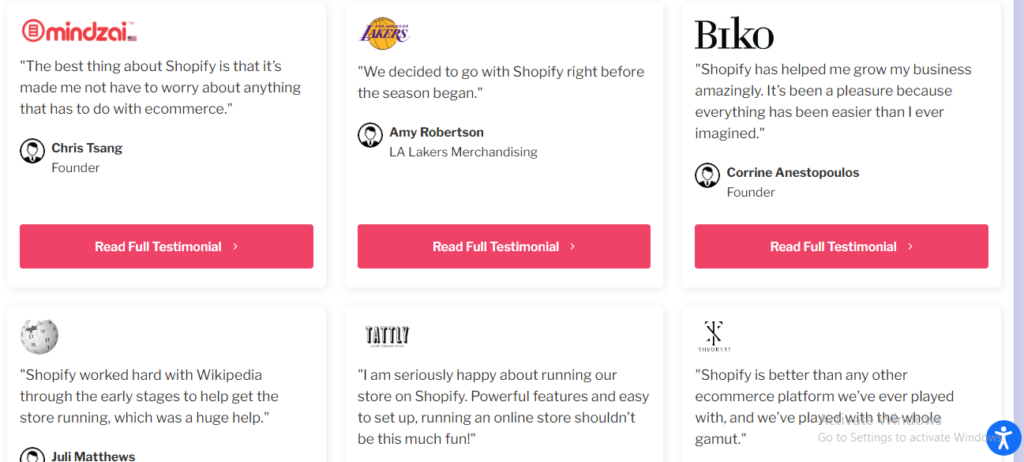
Wix: Wix is often lauded for its user-friendly design interface and simplicity, making it a favorite among users who are new to website building and e-commerce. The platform’s drag-and-drop editor and attractive templates receive high praise for enabling the creation of aesthetically pleasing websites with ease. However, some users note that while Wix is great for small to medium-sized stores, it may not be as scalable as Shopify for larger e-commerce operations. Additionally, while Wix’s e-commerce tools are improving, they are sometimes viewed as less extensive compared to Shopify’s offerings.
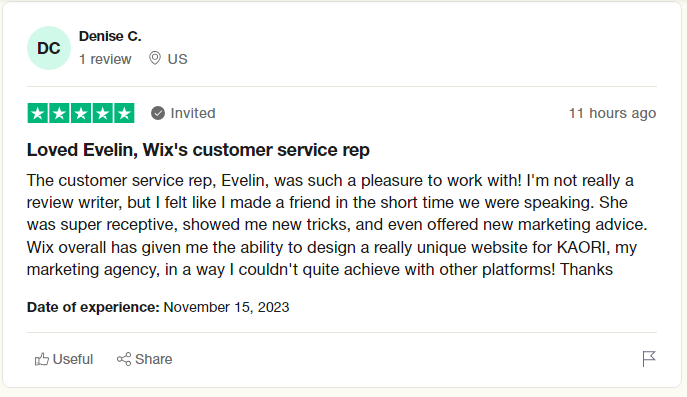
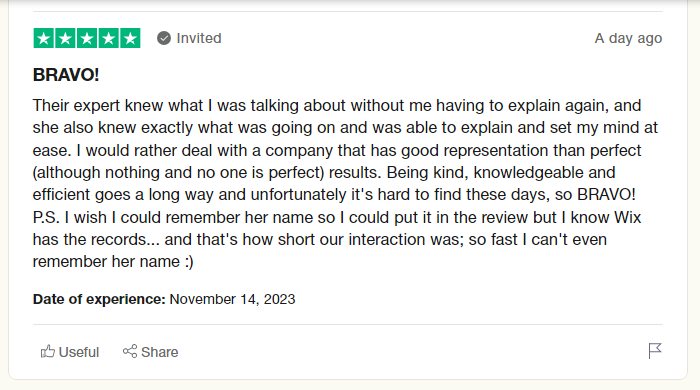
Both Shopify and Wix have their strengths and weaknesses as reflected in user reviews and community feedback. Shopify is often favored for its e-commerce prowess and scalability, whereas Wix is preferred for its ease of use and design capabilities.
Conclusion and Recommendations
When deciding between Shopify and Wix for your e-commerce needs, it’s important to consider the specific requirements and goals of your business. Both platforms offer unique strengths that cater to different types of users and business models.
Shopify stands out as a comprehensive, scalable e-commerce solution. It’s best suited for businesses that are focused primarily on online sales and are looking for a platform that can grow with them. The range of features, extensive app store, and robust scalability make Shopify an excellent choice for both small startups and large enterprises. If your priority is e-commerce functionality, and you’re planning for significant growth or already experiencing high sales volumes, Shopify is likely the more suitable option.
Wix, on the other hand, is ideal for entrepreneurs, creatives, or small to medium-sized businesses that value ease of use and design flexibility. If you’re looking to create a visually appealing online presence with integrated e-commerce capabilities, but don’t require the extensive features of a more advanced e-commerce platform, Wix is a great choice. It’s also a good fit for those who are new to website building and want a simple, straightforward platform.
Recommendations:
- For businesses prioritizing e-commerce with a need for scalability and advanced features: Choose Shopify.
- For small businesses, creatives, or anyone prioritizing ease of design and simplicity in managing their online store: Choose Wix.
In conclusion, both Shopify and Wix have their merits. Your choice should be based on your business size, growth plans, technical expertise, and specific e-commerce needs. By aligning the platform’s strengths with your business objectives, you can make an informed decision that sets the foundation for your online success.

